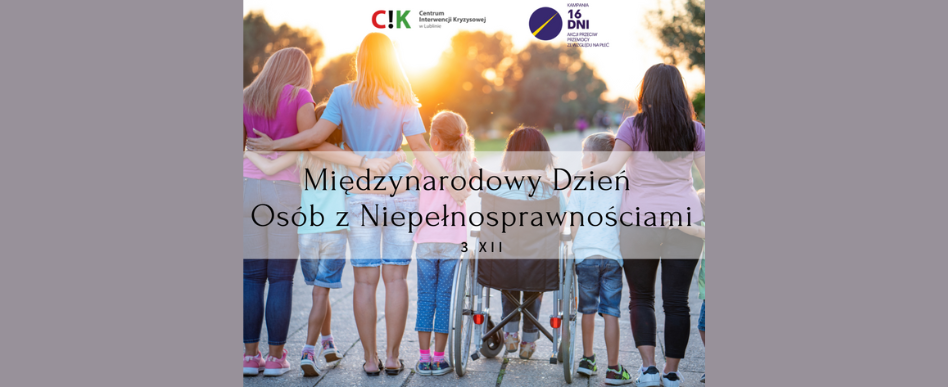Surveys indicate that violence against people with disabilities is less socially acceptable than violence against other groups. Respondents indicated that such violence is more often noticed and met with a clear social response rather than indifference. The cited data is very encouraging, but let’s not forget that the fact that a phenomenon is rarer than another does not mean that it does not occur at all, especially since the authors of the survey themselves say that the data on violence against people with disabilities may be underestimated:
“31.9 percent of respondents have encountered hitting or beating outside their own family.
34.4 percent with isolating or confining people with disabilities,
More than 60 percent of respondents maintained that they had not witnessed or heard of forms of physical violence against people with disabilities in the family,
The least frequently indicated form of violence against people with disabilities (outside the family and within the family ) was sexual violence,
The most frequently indicated form of violence against people with disabilities was the taking of material goods(…)It is worth noting the lack of statistics on violence against people with disabilities and, therefore, the difficulty in estimating the actual scale of the phenomenon. People with disabilities rarely report situations of violence, one can guess that the reason for this situation is limitations in communication and fear of worsening the situation and escalation of abuse. They most often suffer violence from those closest to them, with whom they have a relationship of dependence. Due to limitations, dependence on the perpetrator for the provision of basic needs, a disabled person is less able to resist the abuse. Limitations in reaching out for help mean that many cases of violence against people with disabilities remain undisclosed. “*
No one can harm you. In a situation of experiencing violence, do not hesitate – contact the appropriate services (e.g., emergency phone 112).If you are in crisis and need an anonymous conversation, you can call the 24/7 CIK helpline – 733 588 900. You can also contact us at 81 466 55 46 (7am-7pm) to arrange a free visit to a psychologist or ask about other available forms of help. Free legal assistance is also available for people using psychological help at CIK.Don’t remain indifferent! React to every manifestation of violence – especially towards people who cannot defend themselves – they are the ones who need our help the most.
We realize that everyday care for a loved one with a disability is a difficult task, requiring excellent organization, constant attention and often sacrifice. Being in a situation of not fully meeting your own needs for a long time can lead to a crisis. A very important factor in prevention is that people caring for people with disabilities take care of their own mental and physical well-being. Remember that if you are such a caregiver and feel overwhelmed – you are not alone! You can use the help offered by the Crisis Intervention Center in Lublin – come, call and let yourself be helped in this difficult path that you overcome every day:
Crisis Intervention Center in Lublin, ul. Probostwo 6A: 81 466 55 46
24-hour helpline for people in crisis: 733 588 900
Helpline for children and youth (Mon-Fri 14-22, Sat-Sun 9-14): 789 777 981
*source: https://www.wroclawpsychoterapeuta.pl/przemoc-wobec-osob…/ (02.12.2024)
“Domestic violence against the elderly and disabled. Report from a nationwide study”
